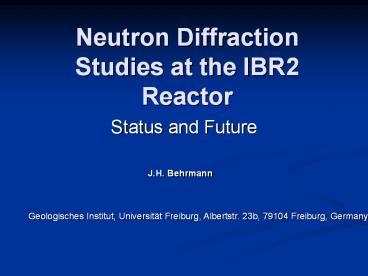Neutron Diffraction Studies at the IBR2 Reactor - PowerPoint PPT Presentation
Title:
Neutron Diffraction Studies at the IBR2 Reactor
Description:
... Neutron texture diffractometer Parameters of SKAT Main advantages of SKAT Polyphase rock sample: calcite + quartz +/- dolomite EPSILON ... – PowerPoint PPT presentation
Number of Views:116
Avg rating:3.0/5.0
Title: Neutron Diffraction Studies at the IBR2 Reactor
1
Neutron Diffraction Studies at the IBR2 Reactor
- Status and Future
J.H. Behrmann
Geologisches Institut, Universität Freiburg,
Albertstr. 23b, 79104 Freiburg, Germany
2
Status and Future
- Experimental facilities available
- Possible ventures into new equipment
- Examples of current studies
- Future experimental activities
3
SKAT - Neutron texture diffractometer
Experimental facilities
4
Parameters of SKAT
Total flight path (moderator detector) 103.81 m
Range of wavelengths ? 0.8 7.6 Å
Range of d-spacings 0.6 5.6 Å
Detectors up to 21 3He single tube, Ø 60mm, unique scattering angle 2Q90
Collimators two sets of Gd-coated soller collimators, angular dispersion 18 and 45, cross section 55 x 55 mm
Resolution Dd/d 0.55 at d 2 Å(18 collimation) 0.7 at d 2 Å (45 collimation)
Beam cross section 50 x 85 mm
Typical sample volume 20 50 cm3
Experiment control VME-based measuring system running OS-9 and X WINDOW
5
Main advantages of SKAT
- low absorption of neutrons in matter large
sample volumes accessible - TOF complete diffraction patterns can be
recorded - application of multiple detectors measurements
are fast - excellent spectral resolution suitable for
polyphase geological samples with many
diffraction lines - unique scattering angle 2? of all detectors
minimum of intensity corrections required
6
Polyphase rock sample calcite quartz /-
dolomite
7
EPSILON -
Experimental facilities
8
Parameters of EPSILON
9
Main advantages of EPSILON
- Excellent spectral resolution because of long
flight path (gt 100 m) - Intensity gain by operation of radial collimators
and multi-detector system - Simultaneous detection of nine different
directions on Debye-Scherrer cone offers
possibility for strain tensor estimations - Detection of lattice strains by Bragg peak shift
and broadening - Uniaxial pressure device (max. load 150 MPa) for
in situ deformation of samples - Laser extensometer for in-situ determination of
macroscopic sample strain - Temp. cabin for thermal stability (DT /- 0.5 K)
10
Possible ventures into new equipment
- Construct new neutron guide (curved)
- Achieve approx. 10x increase in available
proportion of thermal neutrons
11
Examples of current studies
12
Anisotropic thermal expansion of
rocks/minerals,Fabric destruction of building
stones by weathering
13
Bent marble facade panels
14
Compressional wave velocity anisotropy in rocks
quartz single crystals
15
Texture-related compressional wave anisotropy in
Quartzites, Naxos Island, Greece
16
Comparison of texture-inducedand
microcrack-induced Vp anisotropy
Texture-induced, quartzite, Naxos
microcrack-induced, quartz-rich gneiss, Austrian
Alps
17
Studies of relation between textures and acoustic
anisotropy are vital for the understanding of
seismic reflectors in the deep Earths crust
18
Residual lattice strains in crystals and rocks
19
Bragg peak shift as residual lattice strain
indicator
20
Future experimental activities
- Future projects should either contain a component
of instrument development, to be carried out when
reactor is being reconstructed - or have close relation to measurement of other
physical properties of geo-materials (elastic,
plastic, magnetic, thermal, strain state), not
using neutron radiation - or address fundamental questions in applied
geo-materials research - or emphasize on development of novel methods of
data analysis
21
Expressions of interest
- Rock anisotropy
- elastic (Behrmann, Freiburg Kern, Kiel
Nikitin/Ivankina, Dubna) - thermal (Siegesmund, Göttingen)
- magnetic (de Wall, Würzburg)
- strain state (Frischbutter, Potsdam)
- Texture for kinematic analysis
- (Kroner, Freiberg Behrmann, Freiburg)
- Mathematical background (Schaeben, Freiberg
Nikolayev, Dubna)































